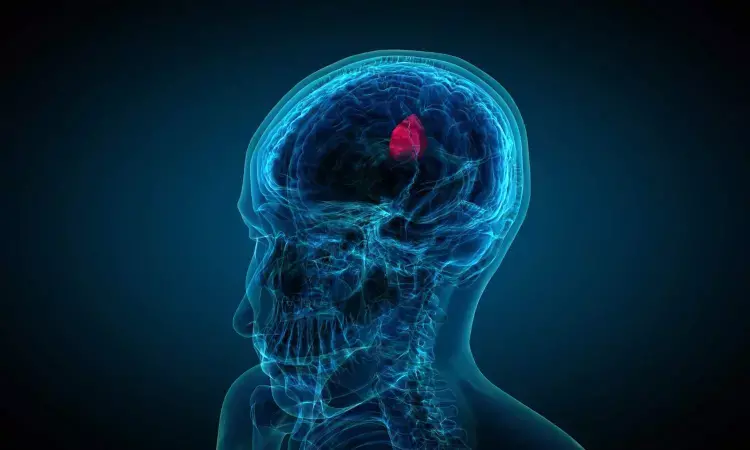- Home
- Medical news & Guidelines
- Anesthesiology
- Cardiology and CTVS
- Critical Care
- Dentistry
- Dermatology
- Diabetes and Endocrinology
- ENT
- Gastroenterology
- Medicine
- Nephrology
- Neurology
- Obstretics-Gynaecology
- Oncology
- Ophthalmology
- Orthopaedics
- Pediatrics-Neonatology
- Psychiatry
- Pulmonology
- Radiology
- Surgery
- Urology
- Laboratory Medicine
- Diet
- Nursing
- Paramedical
- Physiotherapy
- Health news
- Fact Check
- Bone Health Fact Check
- Brain Health Fact Check
- Cancer Related Fact Check
- Child Care Fact Check
- Dental and oral health fact check
- Diabetes and metabolic health fact check
- Diet and Nutrition Fact Check
- Eye and ENT Care Fact Check
- Fitness fact check
- Gut health fact check
- Heart health fact check
- Kidney health fact check
- Medical education fact check
- Men's health fact check
- Respiratory fact check
- Skin and hair care fact check
- Vaccine and Immunization fact check
- Women's health fact check
- AYUSH
- State News
- Andaman and Nicobar Islands
- Andhra Pradesh
- Arunachal Pradesh
- Assam
- Bihar
- Chandigarh
- Chattisgarh
- Dadra and Nagar Haveli
- Daman and Diu
- Delhi
- Goa
- Gujarat
- Haryana
- Himachal Pradesh
- Jammu & Kashmir
- Jharkhand
- Karnataka
- Kerala
- Ladakh
- Lakshadweep
- Madhya Pradesh
- Maharashtra
- Manipur
- Meghalaya
- Mizoram
- Nagaland
- Odisha
- Puducherry
- Punjab
- Rajasthan
- Sikkim
- Tamil Nadu
- Telangana
- Tripura
- Uttar Pradesh
- Uttrakhand
- West Bengal
- Medical Education
- Industry
Zinc-transporting protein contributes to aggressive growth of brain tumor, OU researchers find

In a study published Wednesday in the Proceedings of the National Academy of Sciences (PNAS), University of Oklahoma researchers detail their discoveries about why the brain tumor glioblastoma is so aggressive. Their findings center on ZIP4, a protein that transports zinc throughout the body and sets off a cascade of events that drive tumor growth.
About half of all malignant brain tumors are glioblastomas, the deadliest form of brain cancer with a median survival rate of 14 months.
“Surgery for glioblastoma is very challenging, and patients almost always experience a relapse,” said the study’s senior author, Min Li, Ph.D., a professor of medicine, surgery and cell biology at the University of Oklahoma College of Medicine. “By better understanding why these brain tumors are so aggressive, we hope to open up paths for new treatments.”
Under normal conditions, ZIP4 plays a positive role, transporting and maintaining the right amount of zinc for good health. However, when brain cancer is present, ZIP4 takes on a different role. In the case of glioblastoma, it triggers a series of events:
- Glioblastoma takes in about 10 times more zinc than normal brain tissue does.
- Glioblastoma with abundant ZIP4 releases tiny bubble-like packages called extracellular vesicles (EVs).
- Inside the EVs is a protein called TREM1, which normally helps the immune system fight infection, but in this case turns nearby brain immune cells (called microglia) into supporters of tumor growth.
- These microglia release chemicals that allow the tumor to grow.
“Everything starts with the fact that ZIP4 is overexpressed in glioblastoma,” Li said. “That triggers all these downstream events that help the tumor to grow.”
Li’s research team also tested a small-molecule inhibitor to target ZIP4 and TREM1. The inhibitor attached to both proteins, stopping their actions and slowing tumor growth. “This tells us that ZIP4 and TREM1 may be promising therapeutic targets,” he said.
Neurosurgeon, OU College of Medicine Executive Dean and study co-author Ian Dunn, M.D., said the findings are an encouraging step toward combating the aggressive cancer.
“These results are really exciting in such a debilitating cancer. The hope and promise is to translate these findings to novel treatment approaches to improve the lives of our patients,” said Dunn, who has been treating patients with brain tumors for over 20 years.
This is one of Li’s first major publications on glioblastoma, but ZIP4 has been a focus of his pancreatic cancer research for many years. He discovered that overexpression of ZIP4 causes pancreatic cancer cells to be more resistant to chemotherapy and prompts tumor cells to transform themselves so they can stealthily travel to the body’s other organs. In addition, he found that ZIP4 plays a role in the onset of cachexia, a muscle-wasting condition that affects the majority of patients with pancreatic cancer.
Reference:
L. Zhang,J. Yang,Z. Zhou,Y. Ren,B. Chen,A. Tang,K. Zhang,C. Li,H. Zhou,K. Fung,C. Xu,C. Kang,J.D. Battiste,M.S. Bronze,C.W. Houchen,Z. Liu,I.F. Dunn,W.K. Cavenee,& M. Li, A zinc transporter drives glioblastoma progression via extracellular vesicles-reprogrammed microglial plasticity, Proc. Natl. Acad. Sci. U.S.A. 122 (18) e2427073122, https://doi.org/10.1073/pnas.2427073122 (2025).
Dr Kamal Kant Kohli-MBBS, DTCD- a chest specialist with more than 30 years of practice and a flair for writing clinical articles, Dr Kamal Kant Kohli joined Medical Dialogues as a Chief Editor of Medical News. Besides writing articles, as an editor, he proofreads and verifies all the medical content published on Medical Dialogues including those coming from journals, studies,medical conferences,guidelines etc. Email: drkohli@medicaldialogues.in. Contact no. 011-43720751


